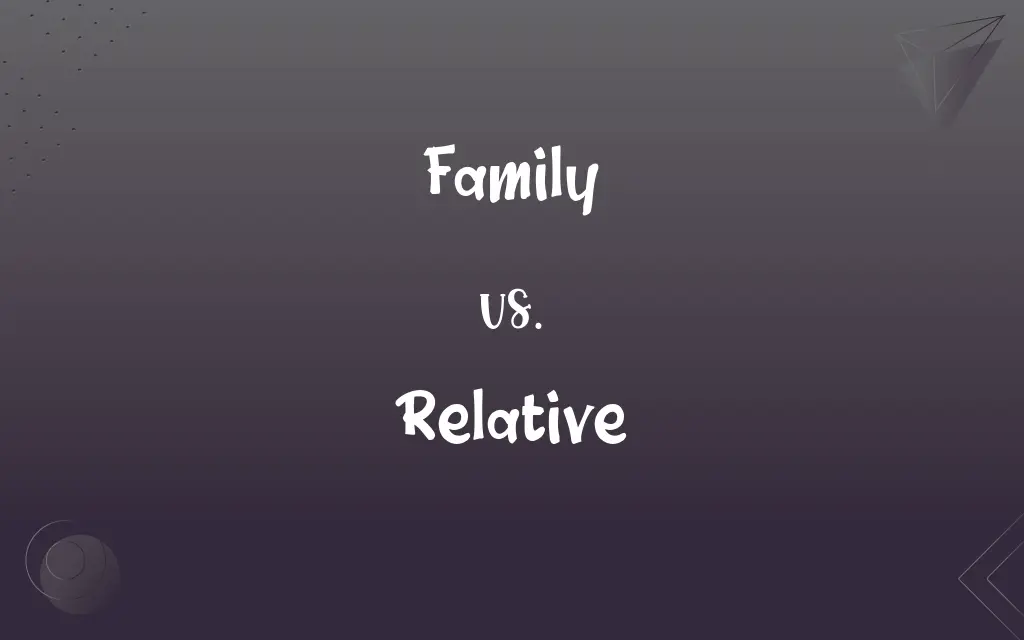Family vs. Relative: What's the Difference?
Edited by Aimie Carlson || By Harlon Moss || Updated on November 8, 2023
"Family" refers to a group related by blood or marriage, while a "relative" is an individual member of this group.

Key Differences
"Family" encompasses a collective group of individuals that often includes parents, children, spouses, and sometimes extended members, who are connected by blood, marriage, or adoption. "Relative" refers to a single member within this group and is used to describe one's connection to another within the family unit.
The term "family" is used to describe a domestic or social unit living together or related by ancestry. It's a broader term that captures the entire network of relationships, while "relative" is specific to each person within that network, such as aunts, uncles, cousins, etc.
When talking about family, it often implies a sense of belonging and shared life experiences, responsibilities, and bonds. In contrast, a relative might simply share a genetic link or a legal tie to the individual, without necessarily sharing the close emotional bonds often associated with family.
The concept of family can extend beyond biological and legal ties to include those who play significant, familial roles in one’s life, such as close family friends. On the other hand, a relative is typically related by blood or law and doesn't encompass those with purely emotional or social familial bonds.
In social discussions, "family" can also represent a unit within society that holds cultural, economic, and social significance, while a "relative" is an individual whose familial significance is typically recognized only within the context of their relation to the family or another individual.
ADVERTISEMENT
Comparison Chart
Definition
A group of related individuals.
An individual member of a family.
Composition
Can include immediate and extended members.
One person related by blood, marriage, or adoption.
Connection
Implies shared life, culture, and obligations.
Specific to one's connection within a family.
Scope
Broad term for the unit.
Specific term for an individual.
Emotional Bonds
Often involves emotional relationships.
May not imply a close bond.
ADVERTISEMENT
Family and Relative Definitions
Family
People related by blood or marriage.
Our family gathers every Thanksgiving for a reunion.
Relative
A person connected by blood or marriage.
I discovered a relative living in Australia.
Family
Individuals that one shares a close personal bond with.
She considers her best friend’s group to be like family.
Relative
A kin, a member of one’s extended family.
The wedding was attended by relatives from around the world.
Family
A group residing together and functioning as a single household.
The entire family moved to a new state for better opportunities.
Relative
In genetics, an individual related by descent from a common ancestor.
DNA tests can help find unknown relatives.
Family
Descendants of a common ancestor.
Their family can trace their lineage back to the 1800s.
Relative
Someone from the same family.
My grandmother's sister is my closest relative on that side of the family.
Family
A category of classification in biological taxonomy.
The lion and tiger belong to the same family, Felidae.
Relative
By extension, anything having a relationship or connection to something else.
Speed is relative to time and distance.
Family
A fundamental social group in society typically consisting of one or two parents and their children.
Relative
Considered in comparison or relation to something else
An animal with a large brain relative to body size.
The relative quiet of the suburbs.
Family
The children of one of these groups
She raised a large family.
Relative
Having pertinence or relevance; connected or related
How are those remarks relative to the discussion?.
FAQs
Is a relative always a direct blood relation?
Not always; relatives can also be related by marriage or adoption.
Can a friend be considered family?
Yes, if there's a close bond akin to familial relationships.
Does family only refer to humans?
Primarily, but it can also refer to a group of animals with common traits.
Can family include extended members?
Yes, extended family can include grandparents, aunts, uncles, etc.
Does the idea of family vary by culture?
Yes, different cultures have varying definitions of family.
Can someone have no relatives?
It's rare, but possible if there are no living kin.
Can relatives be distant?
Yes, some relatives are not closely related and may be termed distant relatives.
Is the term relative used in legal contexts?
Yes, often in matters of inheritance, custody, and marital law.
Are all relatives considered immediate family?
No, immediate family typically means parents, siblings, and children.
Are in-laws considered relatives?
Yes, they are relatives by marriage.
Are adopted children considered relatives?
Yes, adoption legally makes them relatives.
Is a step-parent a relative?
Yes, through marriage to a biological parent.
Does next of kin mean closest relative?
Yes, it typically refers to the closest living blood relative.
In biology, is family more specific than relative?
In biology, family is a taxonomic rank, while relative is not a scientific term.
Is the head of the family also a relative?
Yes, the head of the family is also a relative to other family members.
Can pets be considered part of the family?
Many people view their pets as family members.
Are all members of a family relatives?
Yes, all members of a family are considered relatives.
Is the term family more emotional than relative?
Yes, family often carries more emotional connotations.
Can family be used to refer to a couple without children?
Yes, a married couple can be considered a family.
Do all cultures recognize the same family structure?
No, family structures vary widely across cultures.
About Author
Written by
Harlon MossHarlon is a seasoned quality moderator and accomplished content writer for Difference Wiki. An alumnus of the prestigious University of California, he earned his degree in Computer Science. Leveraging his academic background, Harlon brings a meticulous and informed perspective to his work, ensuring content accuracy and excellence.
Edited by
Aimie CarlsonAimie Carlson, holding a master's degree in English literature, is a fervent English language enthusiast. She lends her writing talents to Difference Wiki, a prominent website that specializes in comparisons, offering readers insightful analyses that both captivate and inform.
































































